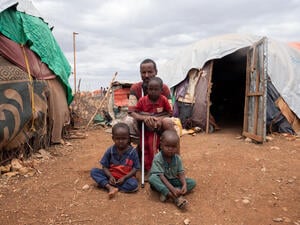Ecuador ID cards give refugees a better chance to start over
Ecuador ID cards give refugees a better chance to start over

Ivorian refugee Aiswarya has her fingerprints taken at the Ecuadorian Civil Registry to obtain an ID card.
QUITO, Ecuador – After fleeing conflict in Ivory Coast, Aiswarya found renting a house or applying for a job as a refugee in Ecuador challenging without an Ecuadorian identity document.
“People do not trust someone who cannot prove their identity with an ID card,” says Aiswarya, who reached the Andean nation’s capital, Quito, with her mother in 1999.
As a recognized refugee, she had a refugee credential, but not everybody accepts such a document.
She overcame that obstacle in November 2017, when the Civil Registry in Quito issued her with an ID card following the entry into force of a law that gave a host of guarantees for people like her on the move.
Among other provisions, the Human Mobility Law established equal treatment for refugees and asylum seekers, granting them residency status that allows for their full integration into national life.
As a key step to implementing these changes, UNHCR, the UN Refugee Agency, has worked closely with the Ministry of Foreign Affairs and Human Mobility and the Civil Registry to ensure refugees are provided with Ecuadorian ID cards.
While refugees and asylum seekers are guaranteed equal rights by the country’s constitution and have had access to key public services including health and education, the lack of a national ID card frequently made dealings with both public and private institutions a challenge.
“After so many years working in Ecuador I will finally be able to ask for a loan and build a house.”
These included difficulties in opening bank accounts and obtaining loans. Without the ID card, it is also difficult to contribute to and enrol in the social security system which is key to getting formal employment and accessing benefits such as a retirement pension.
Ecuador is Latin America’s largest refugee hosting country, having recognized 61,114 by the end of March, almost all of them – 97 per cent - displaced by violence in neighbouring Colombia.
At least 1,100 refugees like Aiswarya have received the identity cards since November 2017, clearing the way for them to take part fully in national life, and contribute to Ecuador’s development.
María Clara Martín, who leads UNHCR’s work in Ecuador, says that providing refugees with ID cards like those held by Ecuadorians is a major step forward. It is “an innovative measure that confirms the country’s international commitment to the integration of refugees.”
The service is currently being provided in Quito, the port city of Guayaquil and Cuenca, in the Andes mountain range. But as many refugees live in remote areas, UNHCR, through its local partner Hebrew Immigrant Aid Society, HIAS, is helping them travel to the cities to receive their cards. So far, over 220 refugees have been able to obtain their ID cards thanks to this support.
For her part, Aiswayra is certain these ID cards will give more opportunities to refugees to build their lives in the new home, with easier access to education and employment. “After so many years working in Ecuador I will finally be able to ask for a loan and build a house,” she said.








